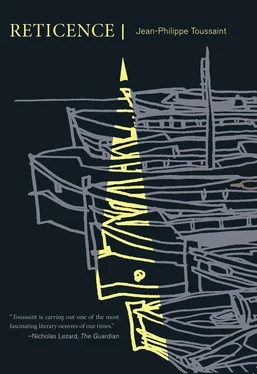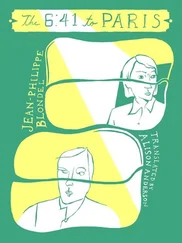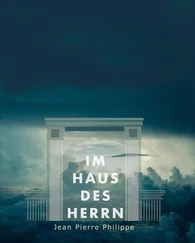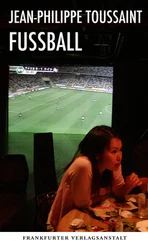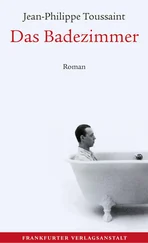The timid ray of sunlight that had succeeded in piercing through the clouds had disappeared by now and the sky was once more low and heavy over the villa, which was enveloped in a thick gray blanket of mist. All of the shutters were closed and the garden was deserted behind the gate, silent and abandoned. Great quantities of dead leaves were scattered all over the grounds, some yellow and still dry, others ruddy and wet, limp and soaked with water, while still others floated on the puddles in the gravel driveway. This was the first time I’d seen the Biaggis’ villa in full daylight since I’d arrived, and it looked very different than how I remembered it from a previous visit, all sunny under a limpid blue sky that had poked through the high branches of the pines and palms. The grass had been dry the last time I was there, mowed short and scorched by the sun, and classical music had wafted from the large, permanently open bay window on the ground floor that led out onto the terrace. Inside the house the depths of the living room had been fresh and welcoming, with the bookshelves barely visible along the walls, while outside a white sun umbrella had shaded the terrace marked by splashes of color from the swimsuits and towels drying on the seatbacks in the sun.
Now the villa was closed and silent, stretching out in the mist behind the wall of the property, and I stood in front of the gate, apparently alone on the road with my son beside me in his stroller. I’d taken out the three letters to Biaggi that I still had in my possession, and looking at them I saw that the brief dunking the night before had done them practically no damage at all. Fine, they looked like they’d gotten a bit wet, the paper was slightly crinkled and puffy in places and the ink had run somewhat on the envelopes, but they were still perfectly presentable, it seemed to me, at least presentable enough to be put back into the Biaggis’ mailbox without anyone suspecting they hadn’t been there since the mailman had delivered them, and, just as I was about to let them go — because I now wanted to get rid of them as quickly as possible — my hand froze and I sensed that passing shiver of dread I always felt before dropping letters into a mailbox, the second when I read the letter over in my mind, going over all the turns of phrase and mentally checking this or that word, suddenly wondering if I’ve spelled it correctly, or even questioning what I’d written, and, while my hand still had the option of pulling back, while only a few inches separated the letters from the box and all of these vague sensations blended inside me, it was at this moment that I let them go — my hand completed its movement and I let the three letters drop into the slot.
Back at the hotel I climbed the little chain-link gate that led onto the terrace and walked silently around the building to the sliding window, where I peered into the dining room with my body hidden in an angle of the wall. The lunch service had begun and I could see the owner trudging heavily back and forth between the tables. He couldn’t see me where I was standing, and as I watched him I realized I now felt a sort of apprehension as far as he was concerned, a vague fear of being in his presence. As I wasn’t particularly hungry I decided not to have lunch, and to take advantage of the owner’s being occupied to check out the two rooms on the third floor I hadn’t been able to enter that morning. Because I wanted to be sure that, as I thought, Biaggi really did have a room at the hotel.
There was no one at the front desk when I went in, and I hesitated for a moment in the dim bluish light, standing beside my son who’d gone to sleep in his stroller. The door to the dining room was open at the end of the hall and I could hear the sound of muffled voices, a vague murmur of conversation mixed with the occasional clatter of knives and forks. No one had heard me come in, and I slipped soundlessly behind the counter to take the key to my room before cautiously taking hold of the keys to rooms fourteen and fifteen, which were also hanging on the corkboard. I went quickly up to my room to put my son to bed, then left again immediately and took the little stairway up to the top floor. I could no longer hear any noise at all from the ground floor, and the silence grew more and more oppressive the further I climbed up the stairs. When I got up to the third floor I walked a couple of yards down the hall. Before slipping the key into the lock of room fourteen I turned around once more toward the stairway, scrutinizing the curved wall in the feeble light. I knew that someone could appear at the top of the stairs at any moment, even Biaggi, because Biaggi must have been outside at the time. Otherwise I didn’t see how Biaggi could have come back to the hotel before me without my seeing him, as I’d been on the road the whole time since I left his property. But now, I said to myself, now, Biaggi could come back to the hotel at any moment and head straight upstairs to his room — all the quicker no doubt when he saw that his key was missing from the reception area.
I turned the key in the lock and opened the door. The room was silent and deserted, and the daylight coming through the window infused the room in a feeble, rainy half-light. The bed was made up against the wall and there were neither clothes nor newspapers; apparently the room was unoccupied. I left and closed the door behind me. There still wasn’t the slightest sound in the corridor. I’d now gone over to the door of room fifteen, which was slightly lower and somewhat indented in the wall, and I had a hard time opening it as it resisted when I pushed. It was a tiny room with a sloped roof, permeated by the smell of cold tobacco. There was just one bed and a table against the wall. Apparently the room had been cleaned this morning, but it seemed that someone had come back in the meantime and sat for a moment on the bed, because the bedspread was crumpled and a small transparent, hexagonal ashtray lay on the floor beside it. There was a travel bag near the door, but what struck me the most was the camera and two lenses on the table. One of the lenses was very short, it could have been twenty-eight millimeters, and the other much longer, a very long zoom lens, two hundred millimeters maybe, protected by a cylindrical, padded leather case. Beside it, also made of leather, was a stiff rectangular bag that must also have contained photographic material, films and filters, other lenses perhaps.
Was it me Biaggi was photographing with this equipment, I wondered all of a sudden, was it me? With this long zoom lens with which you can take photographs of someone from far away without being detected? But why would Biaggi have photographed me in the village without my knowing? Or had he photographed me in the port, on the jetty in the port on one of the previous nights? But at night, I thought, even in the moonlight, because the night before the jetty had been bathed in moonlight, always exactly the same, with the same black clouds sliding across the sky, and even with very sensitive film pushed to the maximum, it must be impossible to identify anyone at all in the photo, which would be very dark, showing nothing more than a stormy night sky in the background, the extended, immobile clouds in the moon’s halo and a silhouette in a dark coat and tie far off on the shadowy outline of the jetty. I was still standing motionless in the doorway when I heard the almost imperceptible sound of tears coming from down below, the very soft sound of my son’s tears drifting up through the ceiling and floorboards.
I went quickly back downstairs where I could now hear the sound of my son’s crying more distinctly. I stood in the stairwell, both keys still in my hand, and had no idea what to do. Should I go straight back to my room to take care of my son, or should I first take the keys back to the reception desk? I took a quick look over the banister to assess the situation down below. Everything was perfectly still, and I started down. I hadn’t quite made it to the bottom when I once again heard the murmur of conversation coming from the dining room, from time to time a short fit of coughing and a chair scraping against the ground and, just as I was about to enter the reception area, I caught a fleeting glimpse of the owner’s silhouette in the hallway. He disappeared almost immediately into the dining room, and I wasted no time in slipping behind the counter and putting the keys back in their place. Then without waiting I went back up to my room to join my son. I opened the door and went straight over to him, knelt at the foot of his bed, and took him in my arms.
Читать дальше
